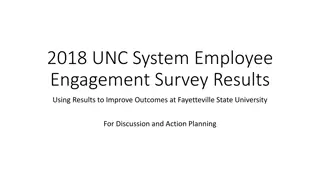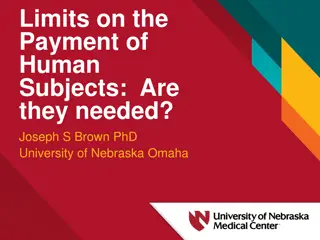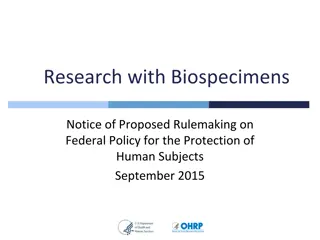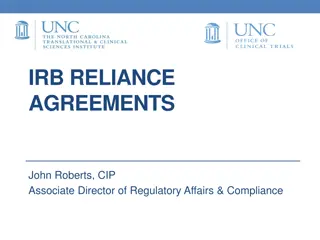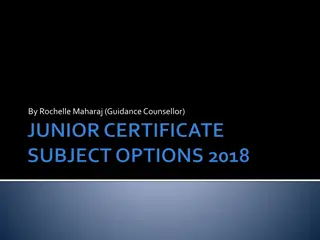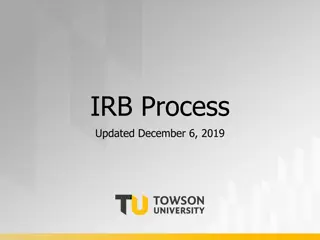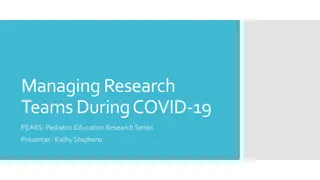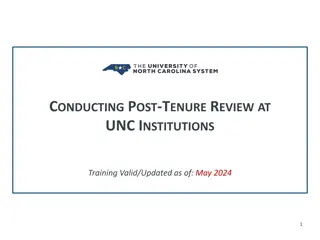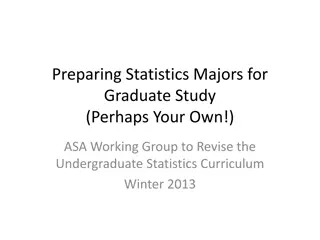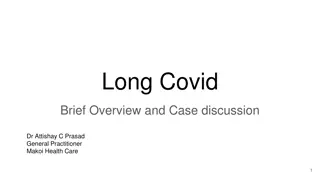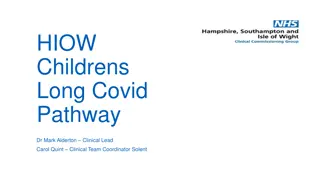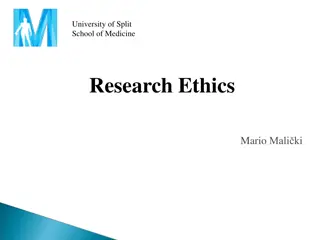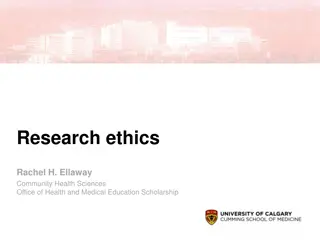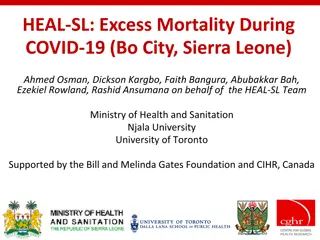UNC Chapel Hill Policy on Human Subjects Research During COVID-19
This document discusses the temporary policy implemented by UNC Chapel Hill regarding human subjects research visits during the COVID-19 pandemic. It covers essential guidelines such as remote operations, enrollment criteria, necessary personnel training, and managing research studies remotely. Researchers are adapting to ensure participant safety and well-being while complying with public health directives. Key takeaways emphasize the importance of remote visits, enrollment considerations, and adherence to UNC Health guidelines.
Download Presentation

Please find below an Image/Link to download the presentation.
The content on the website is provided AS IS for your information and personal use only. It may not be sold, licensed, or shared on other websites without obtaining consent from the author. Download presentation by click this link. If you encounter any issues during the download, it is possible that the publisher has removed the file from their server.
E N D
Presentation Transcript
COVID-19 and Clinical Research Christine Nelson, B.S.N. MBA/HCM, CCRC Office of Clinical Trials Cassandra Myers, B.S., CIP Office of Human Research Ethics
Objectives Review the Temporary UNC Policy on Human Subjects-Related Research Visits at UNC Chapel Hill During the Covid-19 pandemic Review some ways researchers are coping with the challenges Review the frequently asked questions about conducting human subjects research during the COVID-19 pandemic
Temporary UNC Policy on Human Subjects-Related Research Visits at UNC-Chapel Hill during COVID-19 Outbreak Effective March 13, 2020 with updates on March 18, 2020
Key Takeaways Reduced operations, main support offices still open working remotely Perform visits remotely if possible Postpone study visits not providing immediate benefit Immediate benefit determined by PI, participant, participant s care provider and current public health guidance. Updated on March 18th, subject to guidance and direction from UNC Health
Key Takeaways - continued Only those individuals designated as mandatory by UNC HR will be allowed on campus Enrollment of new participants Participation in the trial is essential to the subject's health or well- being The enrollment and subject management can be done remotely Research Studies may be halted if PPE or other required equipment is unavailable
Research Personnel Those designated as essential personnel with study subject direct contact must comply with the following: Receive proper training on phone screening of study subjects prior to face to face visits. Checklist for screening in Epic. Follow UNC Health guidelines regarding screening and PPE UNC Health is temporarily allowing remote access to study monitors Must follow policy posted in Research Central Must include a valid reason in the request to UNC Health HIM Currently scheduling remote monitoring visit out to June 2020
Remote Study Visits School of Medicine WebEx can be used All others Need to request and set up a HIPAA compliant Zoom account Safe computing website has information for setup Zoom accounts have been hacked, please use the waiting room option to ensure only hose invited are able to log into the session Email to study subjects Emails to study subjects should be encrypted
Encrypted emails Study Subjects may have difficulty opening encrypted emails, please give them the following information: If you have a unc.edu email address the email will arrive with (secure) in the subject line and you will be able to open it directly. If you have an email address outside of the unc.edu email network, the email message will arrive encrypted with the subject line: You ve received an encrypted message from xxxx@unc.edu When you open the encrypted attachment, you will have the option to access the message by signing in with a Microsoft account or by creating a one-time passcode. If you use the one-time password option, a numerical passcode will be sent to your email. If you indicate that your computer is secure you will have the option to directly open encrypted messages for up to 12 hours.
All HIPAA Privacy Regulations still apply HIPAA regulations have not been relaxed Use only UNC email to contact study subjects, do not use your personal email While we continue to discourage the use of your personal cell phone to contact study subjects, we understand during this time of remote work it may be your only option. Please only use UNC IRB approved texting, do NOT text from your personal cell phone
New Clinical Trials COVID-19 studies will be prioritized by OHRE, OCT and the Industry Contracting Office Investigator Initiated trials related to COVID-19 can be submitted directly to the IRB without review by the Scientific Review Committee Non-COVID-19 studies continue to work on study start up activities that can be done remotely
Consenting Study Subjects in Isolation FDA Guidance on Conduct of Clinical Trials of medical Products during the COVID-19 Pandemic March 2020 Updated April 2, 2020 - FAQ# 10. Use electronic methods if available If electronic methods are not available Ensure an unsigned consent form is provided to the potential subject by a healthcare worker If direct communication is not feasible or safe, obtain the subject's phone number and arrange a 3-way call or video conference to include an impartial witness Be consistent identify those on the call, review the ICF, respond to questions and have witness confirm the subject's questions were answered Confirm subject is willing to participate Verbal confirmation by the subject that they want to participate in the trial Have the subject sign and date the ICF in their possession If the ICF cannot be collected for safety reasons, obtain an attestation form the witness who participated in the call that the subject agreed to participate OR Photograph the ICF with an attestation from the person obtaining the photograph
Documentation Document the informed consent process include the attestation of the witness Include the attestation of the photographer of the ICF stating how the photograph was obtained and it is indeed a photograph the subject s signature A copy of the ICF with the PI and witness signatures should be placed in the trial records source documents Include a statement of why the ICF signed by the subject was not retained, e.g. due to contamination of the document bey infectious material
Documentation Be sure to document how restrictions related to COVID-19 led to changes in the conduct of the study The duration of those changes Which trial participants were impacted How those trial participants were impacted Important to capture specific information on the CRF explaining why certain data may be missing including the relationship to COVID-19 Maintain investigation product accountability
Key Takeaway-What does this mean for my IRB submission Reduced operations, main support offices still open working remotely: The IRB is still conducting its meetings as scheduled and has added 9 board meetings in response to COVID for April and May. COVID board meetings are for studies that are studying COVID only, Staff are available via email and voice messages left will be returned within 1 working day, as the staff have virtual voicemail. Assigned staff can be identified in IRBIS by accessing the study specific submission:
Key Takeaway-What does this mean for my IRB submission Perform visits remotely if possible Submit a modification if you will be conducting research differently than how it has previously been approved Consider if this changes the consent process vs a need to inform subjects. Identify to the IRB in your modification the following: What does this mean for currently enrolled subjects Does this increase risk to subjects Does this affect the consent process? Are these changes only for the COVID time period?
Consent Processes-IRB Please refer to "Consenting Study Subjects in Isolation and Documentation " slides; Please remember some of this is dependent upon the risk level of the study (minimal risk/greater than minimal risk) and if its FDA regulated. Risk Level/Regulations Full Waiver of HIPAA and Consent Alt. Or Waiver of Signature (Verbal) Signature is Required Minimal Risk-No Intervention/Interaction with subjects *Expedited Categories Yes Likely NA Likely NA Minimal Risk- Intervention/interaction with subjects *Expedited Categories Likely NA Yes If possible, (For electronic consider Qualtrics or other IT approved mechanism) Greater than minimal risk- Full board NA NA Yes (For electronic consider Qualtrics or other IT approved mechanism) Greater than minimal risk-Full Board FDA Regulated NA NA Yes (For electronic must be Part 11 Compliance, check with IT Liaison)
COVID Submission Table-IRB Type of Change Risk Analysis State. COVID State. in Cover Page Included in Mod Desc. Updated Consent Section in App Updated Through-out App Attach. Consent Form Activities Modified due to and duringCOVID only (No Consent Changes) Yes Yes Yes No No As appl. e.g., Letters from Sponsor No Activities Modified due to and during COVID only (Consent Form Changes) Yes Yes Yes Yes- Outline remote proc. As needed No As appl. e.g., Letters from Sponsor Yes Activities Modified for COVID and other study changes Yes Yes Yes, outline all changes As appl. Outline Remote Proc. As needed As appl. As appl. As Appl. New COVID Related Study NA Yes NA Outline Remote Consent Proc. As needed NA All, including any FDA documents, or IND/IDE worksheets Consider: -FDA App. -Assay -Return Results Adding COVID Aims to existing study Yes Yes Clearly outline how this is within current research question As appl. Outline Remote Proc. As ne eded Yes As appl. Consider: -FDA App. -Assay -Return Results
Key Takeaway-What does this mean for my IRB submission Postpone study visits not providing immediate benefit Immediate benefit determined by PI, participant, participant s care provider and current public health guidance. The OHRE/IRB is not suspending studies as this has a different regulatory requirement than the institution setting policy such as the OVCR's office or the UNC Health System If the OHRE/IRB were to suspend a study it needs to be reported to the FDA/OHRP, clinical trials.gov and other funders as the study no longer meets the criteria for approval. The OHRE has placed a statement in letters saying that even if approved by the IRB, that researchers must still follow institutional policies about conducting research, which may include stopping research activities due to lack of direct benefit.
What if the IRB has not approved my submission for COVID changes. Please refer to the OHRE website and the COVID FAQ's: As a reminder, initiating research or modifications to research without IRB approval is permitted to eliminate apparent immediate hazards to the human subjects per DHHS OHRP and FDA regulations. Please submit the modification as soon as available. If you need to "alter your procedures" to remove immediate risk of harm, these should be noted in your deviation log and submitted to the IRB as an NSI if they meet the criteria outline in SOP 1401. Please note your sponsors and monitors are going to want to see analysis of risk in the deviation log.
ClinicalTrials.gov Any changes to Overall Recruitment Status or Human Subjects Protection Review Board Status must be made within 30 days after a status change. Any protocol amendments necessitating Informed Consent changes must be updated within the CT.gov record by no later than 30 calendar days after IRB approval. Given that this information is not centrally tracked, each study team (i.e., Responsible Party) is accountable for ensuring timely CT.gov record updates accordingly.
This Photo by Unknown Author is licensed under CC BY-SA Questions








